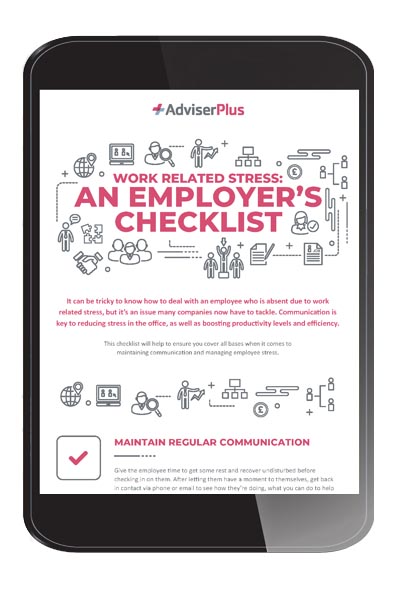A guide on how to handle an employee who is off with work related stress
Stress in the workplace is an increasingly common issue that companies can’t afford to ignore. In fact, 12.5 million working days were lost due to work-related stress, anxiety or depression in 2016/17 according to the HSE.
As well as affecting their everyday lives, employee mental health is incredibly important when it comes to efficiency and productivity in the workplace. It’s therefore more essential than ever that HR managers are confident when it comes to tackling work-related stress and effectively communicating with absent staff.
Although stress isn’t technically an illness in itself, it can lead to – or be symptomatic of – a variety of other mental and physical illnesses. This includes anxiety, eczema, depression and even heart disease.
It’s imperative to understand your role – and how to help rather than hinder employee stress.
How to handle employees off with work related stress
If an employee is absent for less than seven days, they can self-certify their illness and will benefit from a return to work interview upon their return. Although this isn’t mandatory, it’s a vital way of getting them back into the flow of things and learn more about their issues.
You can request that an employee provides a Statement of Fitness for Work from their GP if they’re off work for longer than seven consecutive days. This includes both weekdays and weekends, even if the employee doesn’t normally work on these days.
 The GP filling in the statement will be the one to decide if the staff member is unfit to return to work or will suggest measures to undertake that will help them de-stress at work. The employee will be considered unfit for work if you don’t agree to go ahead with these measures – showing the importance of doing what you can to help when this is requested.
The GP filling in the statement will be the one to decide if the staff member is unfit to return to work or will suggest measures to undertake that will help them de-stress at work. The employee will be considered unfit for work if you don’t agree to go ahead with these measures – showing the importance of doing what you can to help when this is requested.
Maintaining Communication:
Regular communication with an employee who is off for a longer period is beneficial for both parties, as long as it’s utilised correctly.
This isn’t just about illness either – you want to ensure they are regularly updated about any changes to their role or team, including potential promotions, new hires and any major changes to company policy. Feeling out of the loop might add to someone’s anxiety.
Initially, have a chat with them about how they’re feeling and don’t push them to give a date by which they’ll return to work. This should come in time, once an employee is happy to go over the topic and you need to be patient and prepared to wait until they’re good and ready to talk. Remember, pressure from you could make a situation worse. Your employee needs time to rest and have some peace away from work. Let them have a day or two of recovery before getting back in contact via phone call or email.
Once you eventually have a return date in mind, you can consider any changes that can be immediately implemented to help them get back to work.
We have a great guide on when to get in touch with employees on sick leave here and you should treat mental health the same as any other illness or condition.
If an employee’s absence reaches a serious stage and you wish to consider ending their employment (in extreme cases only) then it’s crucial to check the company policy and ensure you act fairly and reasonably before proceeding with a dismissal. You must give the employee a fair warning of this to give them the chance to discuss their case and come to a better conclusion.
Return to work interview:
A return to work interview is a great way to help an employee who has been absent. Not only will it let you understand the cause of their stress, but it also gives you an opportunity to hear what changes can be made to improve the workplace environment to help them in the future.
Always be mindful when asking anyone about work-related stress; it’s vital that you discuss mental health in an approachable and open minded way. It may be called an interview, but try to treat it as more of an open discussion in which you both ask questions and listen to the other party empathetically. Again, the wrong tone and style here could contribute to a problem rather than helping to solve it.
What to ask in a return-to-work interview:
- Start with a friendly welcome. Avoid jumping straight into discussing stress and instead focus on making them comfortable – set the tone right away that this isn’t an interview or an interrogation.
- Encourage an open and honest discussion. Many people find it difficult to talk about their mental health, especially when it involves work. Promote honesty and ensure they aren’t afraid to talk about problems in the workplace.
- Understand the root cause of their absence. There are many potential causes of work related stress so don’t assume it’s one thing or the other. Let the employee divulge the reason behind their anxiety rather than jumping the gun or by putting words into their mouths.
- Discuss possible changes to duties. Whether the company wants to take off some of the workload or it’s the staff member themselves that requests a change, you may have to make some adjustments. Consider what it is that they need to feel happier at work to get them back on track.
- Organise another chat for the future. Although you don’t want to look like you’re constantly hounding the employee, organising another meeting to find out how they’re doing is a good idea – and lets them know that they aren’t going to be left to work out the solution by themselves.
What to avoid in a return to work interview:
- Be careful who you tell. While it’s true that certain members of staff need to be informed, it’s important to keep the discussion as private as possible. Inform those who need to be aware, such as the manager or director, but don’t turn the matter into office gossip. It might put the employee’s mind at rest to know that you have been discreet.
- Pick somewhere private rather than an open space. Such an important discussion should be done in a quiet location that’s unlikely to be disturbed or overheard. Consider holding it off site if necessary.
- Don’t forget about the discussion. Keep up with your promises and make any workplace changes you have discussed.
- Don’t pressure them to come back to work. This will only put more stress on them before they’re ready and will most likely cause a burnout.

Read The Absenteeism Report 2018: Causes, consequences and cures to find out more about the key role played by back-to-work interviews.
Reducing Employee Stress:
Reducing employee stress is essential for both the company and the staff; high turnover and training new staff can be expensive so it’s important to up morale to keep staff in their jobs.
Once you’ve had a discussion with your worker, it’s important to take what they’ve said on board and make some changes – this might well benefit other members of the team too.
Before making these adjustments, you should learn about the signs and causes behind work related stress. There are a variety of issues that could spark anxiety amongst staff including:
- heavy workloads with tight deadlines
- job insecurity
- demanding colleagues or clients.
Communication is key to deciphering which triggers are causing employees to feel under pressure and stressed. Successful HR teams will be able to spot these and react accordingly.
How to manage employee stress:
- Introduce a flexi-time system. There are plenty of benefits to flexi-time that might help reduce everyday triggers of stress. From avoiding heavy traffic while commuting to scheduling school drop-offs, offering flexible work hours can offer staff more control without reducing productivity.
 Encourage proper lunch breaks. It’s vital that your employees take a break from their work or they may suffer a burnout. Busy deadlines often cause workers to continue working all day while skipping lunch which leaves them lethargic. Encourage workers to take a break away from their desk.
Encourage proper lunch breaks. It’s vital that your employees take a break from their work or they may suffer a burnout. Busy deadlines often cause workers to continue working all day while skipping lunch which leaves them lethargic. Encourage workers to take a break away from their desk.- Keep an eye on workloads. As mentioned above, too many heavy deadlines can cause people to become stressed and low in work morale. Make sure employees don’t feel overwhelmed by ensuring they don’t have too much work due at the same time. Spreading work evenly across a team and time frames can reduce the burden on one person.
- Keep morale high with events and benefits. Staff morale has a huge effect on the employee’s attitude to work as well as productivity levels. Lighten the mood to reduce stress by putting on fun events or offering rewards for high performance every now and again.
- Plan regular performance reviews to give feedback. Maintaining communication ensures employees know where they stand, how they can improve and what they are doing successfully. Not only that, but it’ll also ensure you can be alerted to problems from the beginning and solve them as a team.
Download our handy checklist below and check out The Mental Health Report for a more in depth look at this key issue in the workplace.

